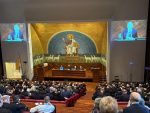By Nirmala Carvalho
Mumbai, March 25, 2019: A leading Asian cardinal says the world’s resources are at the mercy of a minuscule minority, and the “poor are doubly-condemned by an economy that favors the powerful and a carbon hegemony that destroys their livelihood.”
Myanmar Cardinal Charles Bo, the president of the Federation of Asian Bishops’ Conferences, was speaking at a March 19 event on the Amazon at Georgetown University.
The Amazon will be the topic of the Oct. 6-27 meeting of the Synod of Bishops in Rome.
During his lecture, the cardinal noted that Myanmar, also called Burma, is one of the poorest countries in the world.
“I have always worked with simple ethnic and indigenous communities. I come from a country where the Church is an ethnic, indigenous church,” Bo said.
“We have watched in pain the destruction of the ethnic and indigenous way of life by the onslaught of market economy-oriented colonization. This is the norm elsewhere,” he said.
The cardinal said the world owes “ecological reparation” to indigenous communities which have been broken up by the formation of the nation state.
“I wish to bring to your notice the existence of our own Amazonia [in Asia]. This is called the Zomia in our place. This is a vast stretch of land mass from the South China seas to the center of Asia where more than 60 million of the ethnic people once lived in harmony with the nature. Now they are looted, their resources are for sale and the environmental degradation has created virtual hell for all,” Bo said.
The cardinal noted that most Christians in Myanmar were previously animists, and had a sense of wonder at nature and imputing divinity into life.
“The Christian encounter was a blessing in many places but it was a disaster in many other places since often the missionary was followed by the merchant and the military, paving the way for colonial imperialistic penetration of the communities and territories where the life was intrinsically welded into the divinity,” he said. “The trauma that ensued resulted in the loss of sacred. Nature was open to the looting.”
Bo made several suggestions, beginning with an ecological conversion which is “a sort of reverse evangelization.”
“We need to be evangelized by communities whom once the mainstream religions thought of as ‘barbaric, jungle cultures.’ The Church has called for an ecological conversion,” the cardinal explained.
“For thousands of years, the indigenous communities have lived in harmony with nature, never allowing private ownership of lands, never hoarding natural resources. Market economy, fundamentalism and nation state infatuation have not allowed an alternate vision.”
Bo said the challenge today is to rediscover the Christ that was countercultural, as opposed to today’s “domesticated” Christ, including that promoted by the “prosperity Gospel” popular in many parts of the world.
The cardinal also called for a “green theology of liberation,” that would address the “cry of the earth” ignored by earlier liberation theologians.
“Poverty affects the certain sections of population while the cry of the earth has intergenerational implications,” he said.
Bo pointed out that any Green New Deal would have to have a “spiritual flavor.”
“I am really heartened by the initiatives like Green New Deal. The idea is still contested and may need many clarifications before it could be implemented. It needs to bring forth the Catholic Social Teaching principle of human dignity and integrity of creation,” he said.
“The Green New Deal needs to be fortified by spiritual foundations. That this idea is being discussed is a refreshing encouragement. Not everything is lost. But this is the time to act,” the cardinal said.
Finally, he noted that indigenous religions have treated nature as sacraments, “the symbols of holy.”
The cardinal said in these religions, the five elements – Water, Fire, Air, Earth and Atmosphere – are treated as sacraments and worshiped.
“The Bible has spoken about these elements in awe and fear. That these elements are recognized as part of our liturgy though their intrinsic sacredness is still beyond the faith experience of our Catholics,” Bo added.
(Source: cruxnow.com, March 23, 2019)









